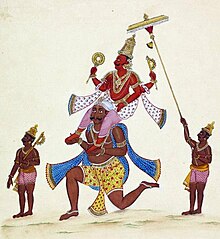Nirṛti
Nirṛti (
Etymology
The Sanskrit word Nirṛti means 'decay' and is derived from nirṛ (lit. 'to separate'). It can be interpreted as meaning "devoid of ṛta/i", a state of disorder or chaos.[1][2]
The name nirṛti has the meaning of "absence of ṛta", meaning 'disorder', or 'lawlessness', specifically the guardian to the absence of divine or cosmic disorder.[2][3]
This term was used in Vedic texts to indicate a realm of non-existence and absolute darkness, which threatened to consume those who failed in their duties to sacrifice and procreate. In nirṛti, there was no light, no food, and no children: none of the necessary elements of Vedic life and ritual.[2]
Goddess
Nirṛti is mentioned in the hymns of the
In later Hindu texts, Nirṛti was re-conceptualized as a deity. According to some texts, she is the wife of
Dikpala

According to some scholars and authors, the goddess Nirṛti transformed into a male in later Hindu mythology and became a
Nirṛti is sometimes included as one of the
References
- ^ ISBN 978-0-89254-616-9.
- ^ a b c d Witzel, Michael. “Macrocosm, Mesocosm, and Microcosm: The Persistent Nature of 'Hindu' Beliefs and Symbolic Forms.” International Journal of Hindu Studies, vol. 1, no. 3, 1997, pp. 501–539. JSTOR, www.jstor.org/stable/20106493. Accessed 10 Mar. 2020.
- ISBN 978-81-7625-039-9.
- ISBN 81-208-0394-9, p.13
- ISBN 0-14-029570-4, pp.80–1
- OL 35543927M.
- ^ Mani, Vettam (1975). Puranic encyclopaedia : a comprehensive dictionary with special reference to the epic and Puranic literature. Robarts - University of Toronto. Delhi : Motilal Banarsidass. p. 540.
- ^ "Śrīmad-bhāgavatam 4.8.2". vedabase.io. Retrieved 2021-12-12.
- ISBN 978-0-19-535294-8.
- ISBN 978-1-59477-733-2.
- ISBN 978-81-7625-039-9.
- ISBN 978-0-14-341421-6.
- ISBN 978-0-89281-354-4.
- ISBN 978-81-208-1273-4.
- ISBN 978-81-7030-763-1.
- ^ a b Gopinatha Rao, T. A. (1916). Elements Of Hindu Iconography, Vol. II Part II. pp. 527–529.
- ^ Rodrigues, E. A. (1842). The Complete Hindoo Pantheon, Comprising the Principal Deities Worshipped by the Natives of British India Throughout Hindoostan: Being a Collection of the Gods and Goddesses Accompanied by a Succinct History and Descriptive of the Idols. E.A. Rodrigues.
- ^ Mani, Vettam (1975). Puranic encyclopaedia : a comprehensive dictionary with special reference to the epic and Puranic literature. Robarts - University of Toronto. Delhi : Motilal Banarsidass. pp. 62, 540.
Sources
- Dallapiccola, Anna L. (December 2002). Dictionary of Hindu Lore and Legend. ISBN 0-500-51088-1.

